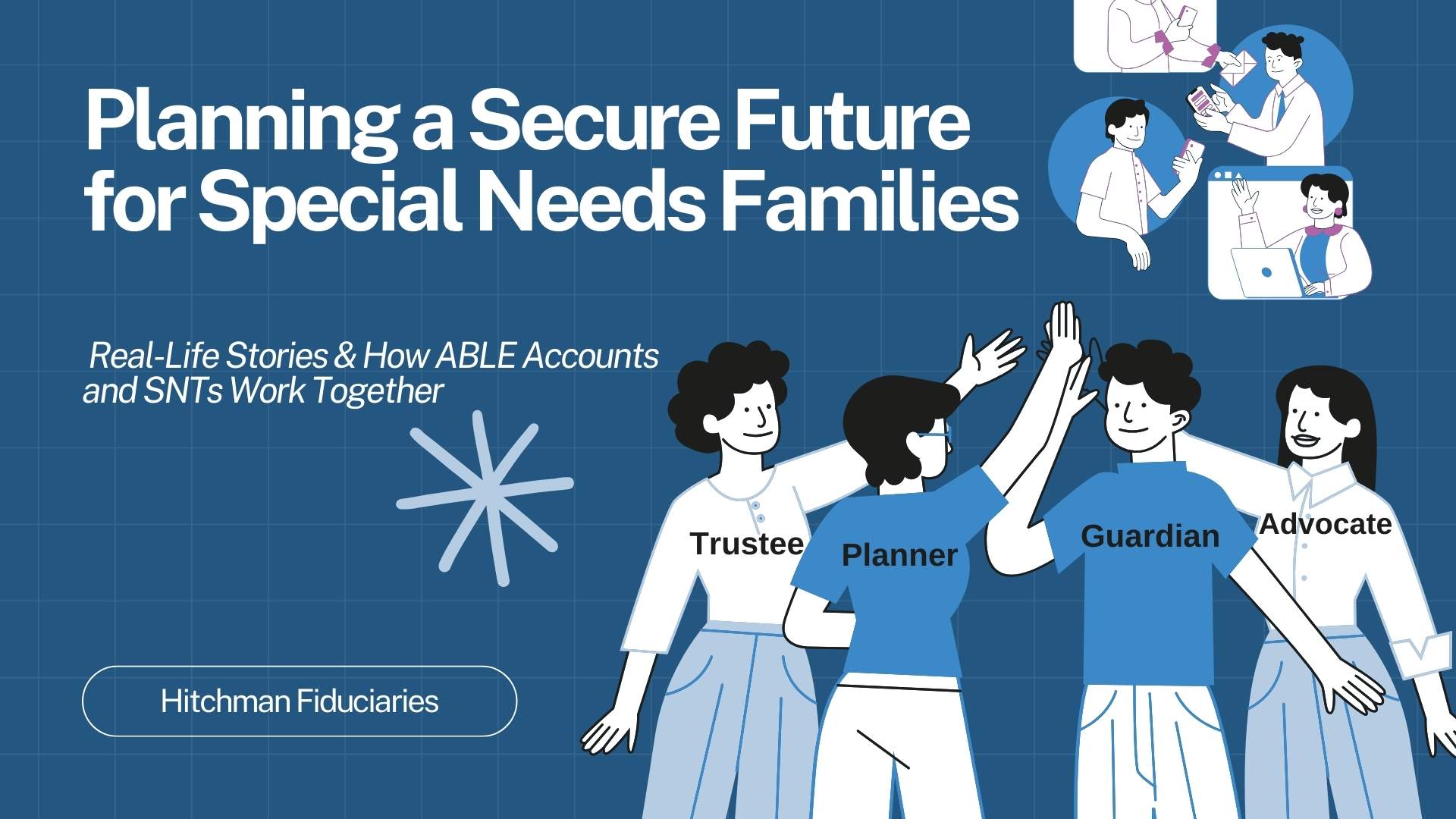
December 20, 2024
Planning for the Future— Real-Life Stories and Solutions for Families with Special Needs
Special Needs Beneficiaries & Preparing For A Complex Future
I've met many families throughout my years of helping those with loved ones with special needs. I've seen firsthand how easily well-meaning folks can make mistakes that have significant consequences down the road. The following stories aren't about actual clients, but they're based on common situations I've encountered throughout my years of helping families navigate this complex landscape.
Let's explore how the power duo of ABLE accounts and Special Needs Trusts (SNTs) can help protect your loved one and provide peace of mind.
Meet the Smiths
Their son, Ethan, is a bright and outgoing 10-year-old who loves to write stories and play adaptive sports. He dreams of becoming an artist one day. Ethan has muscular dystrophy and receives SSI and Medicaid benefits. His parents want to ensure he maintains his independence and continues to receive the support he needs to thrive.
Now, let's imagine a scenario where Ethan's parents don't have a proper estate plan in place. If something were to happen to them, their assets would likely go directly to Ethan, potentially disqualifying him from his much-needed government benefits. Tragically, his parents passed away one shortly after the other, leaving Ethan with limited resources and fewer opportunities to pursue his dreams.
The Chens and the Importance of Guardianship
Our next family, the Chens, has a daughter, Lily, who loves dancing, painting, and gardening with her mom. Lily has Down syndrome and will likely need care for her entire life. Her parents want to ensure she continues to receive the same love and support after they're gone. They also hope her older sister, Grace, will be able to play a role in her care.
In a situation where the Chens don't have a comprehensive plan, and if they were to pass away unexpectedly in an automobile accident, the court might appoint Lily's grandparents as guardians, even if they live far away or are unable to provide the necessary care. This could disrupt Lily's life, forcing her to move and adjust to a new environment.
The Taylors and the Need for Flexibility
Our last family, the Taylors, faces a different challenge. Their son, Jacob, suffered a traumatic brain injury during a motocross sports accident. He struggles with cognitive impairment, depression, and difficulty maintaining employment. His parents want to ensure he has financial stability and the support he needs to live as independently as possible.
Without proper planning, Jacob might inherit his parents' assets outright, potentially disqualifying him from government benefits and leaving him vulnerable to financial exploitation.
ABLE Accounts and Special Needs Trusts (SNTs): A Powerful Combination
The stories of the Smiths, Chens, and Taylors highlight the challenges families can face when a loved one has special needs. But there are solutions. For more information, visit the Social Security Administration’s Supplemental Security Income (SSI) page. The power duo of ABLE accounts and Special Needs Trusts (SNTs) can help protect your loved one and provide peace of mind.
ABLE Accounts
- Purpose: Tax-advantaged savings accounts for individuals with disabilities.
- Funding: Contributions can be made by anyone (the account beneficiary, family, friends, or even an SNT) and are limited to $18,000 annually.
- Benefits:
- Allows for savings above the $2,000 SSI resource limit, enabling individuals to save for larger purchases without jeopardizing their benefits.
- Provides a sense of control and independence to the beneficiary, as the funds belong to them.
- Offers more privacy than some other tools, as receipts are not typically required for expenditures.
- Can be a strategic tool to avoid triggering In-Kind Support and Maintenance (ISM) penalties when paying for housing costs.
- Limitations:
- The disability must have been present before age 26, and the funds must be used for qualifying expenses.
- Contribution limits exist ($18,000 annually).
- The beneficiary has complete control over the funds, which can be an issue if they struggle with impulse control or managing finances.
Special Needs Trusts (SNTs)
- Purpose: A legal arrangement that allows a trustee to manage assets for the benefit of a person with disabilities.
- Funding: Can hold significant assets, including inheritances, gifts, or settlements.
- Benefits:
- Protects the beneficiary's eligibility for government benefits.
- Provides greater flexibility in how funds are used.
- Offers professional management and oversight of assets.
- Can ensure the beneficiary has resources for their care throughout their lifetime.
- Types:
- Third-Party SNTs: Created by someone other than the beneficiary (e.g., parents, grandparents).
- First-Party SNTs: Created by the beneficiary using their own assets.
The Importance of Planning
These stories illustrate the importance of comprehensive planning that combines ABLE accounts, Special Needs Trusts, and other tools to address the unique needs of each individual and family. Remember, it's about:
- Protecting your loved one's financial future.
- Ensuring they have access to quality care and support.
- Empowering them to live as independently as possible.
Don't wait until it's too late. Start planning today to provide your loved one with the security and opportunities they deserve.
We're Here to Help
Learn more about ABLE National Resource Center for detailed guidance on ABLE accounts and their benefits.
Contact us at Hitchman Fiduciaries (949) 200-9712 to discuss your specific needs and create a plan that provides peace of mind for you and your family.